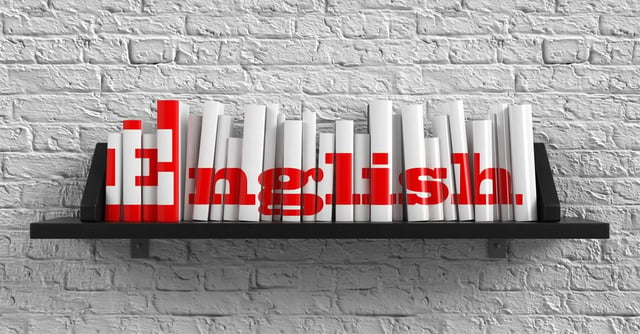The English language spoken today is a fusion of many different roots – French, German, Old Norse, Latin, Celtic and Greek, not to mention the many words borrowed from all over the former British Empire.

However this was not always the case. Take a look at these 4 extracts from the Bible in English. All show the same biblical verse.
Modern Bible around 2000
And God said to Noah ’ Make yourself an ark of gopher wood … and cover it inside and out with pitch. For my part, I am going to bring a flood of waters on the earth, to destroy all flesh in which there is the breath of life ’
King James Bible around 1600
And God said unto Noah ’ Make thee an arke of gopherwood … and thou shalt pitch it within and without with pitch. And behold, I, even I, doe bring a flood of waters upon the earth, to destroy all flesh wherein is the breath of life’
Wycliffe Bible around 1400
He seid to Noe ’ Make thee an ark of planed trees… and with inne and with oute thow shall dichten it with glew. So I shal lede to watres of a flood upon the erthe, and I shal slee al flehs in which the spirit of lijf is’
Aelfric Bible around 1000
And God cwæð ða to Noe:’Wyrc ðe nu ane arc of aheawenum bordum and clæmst wiðinnan and wiðutan mid tyrwan. Efne ic gebringe flodes wæteru ofer eorðan, ðæt ic ofslea eal flæsc on ðam ðe is lifes gast’
What is noticable is that the English text from 1400 (allowing for spelling differences) is remarkably familiar. However what is even more remarkable is the difference between 1000 and 1400.
1000 AD English is almost completely Germanic.
The English or ”Anglish” (The Anglo-Saxons) were themselves invaders from North Germany. They had overthrown the Celts in the 5/6th centuries and established their own society in the lower eastern sections of the British Isles. Unlike the Celts at the time, the Anglo-Saxons, (at least a minority), were literate and thus we have a record of their languages.
Those languages were from the Old Germanic language family. Note their use of the Germanic runic letters ”æ” and ”ð, gender and case endings such as wæteru, and Germanic verb forms such as gebringe and gast.
However we can see by 1400 all this has gone – the runic letters, the genders, the case endings, and in addition the vocabulary has changed enormously.
What on earth happened to English between 1000 and 1400?
In short: INVASION – not just of the land, but of the very language and grammar of the English.
The invasion of French forces from Normandy (the Norman invasion) in 1066 led to the aristocracy and power structure of the Anglo-Saxons being replaced by French speaking nobilty.
This nobilty maintained French as its official language. Indeed it was not until Henry V in the 15th century that England had a king who chose to write in English rather than French. However, in the lower classes, the originally Germanic English was changing under the pressure and influence of French. While thousands of French words were brought into English, often similar Germanic forms still remained. What evolved was a linguistic mirror of the very class system that divided England itself.
This duality of French/German runs throughout English. Compare terms such as cancel versus call off, liberty versus freedom, amity versus friendship, arrange versus set up. This is why English often seems to have multiple terms that have a similar translation in other languages.
However the careful English user will note that the meanings do not exactly overlap. The French origin term maintains a higher style and a more official flavour while the Germanic origin term, although lower in style, can often pack a more emotional punch.
French terms came to represent high style and official use, while German terms had a more informal and emotional effect. Those creating emotional content such as the media, advertisers, and artists utilise Germanic vocabulary to maximise impact. Top ten lists of highest reaction terms online are dominated by Germanic terms such as love, hate, child, cash, fear, crash, crazy, best, worst, lose, burn. Even today we can often say an angry or direct person is ”speaking pure Anglo-Saxon”. Not surprisingly almost all the major English swear words are also Germanic in origin.
Rule of thumb : French for the head and German for the heart!
If you are interested in a more detailed look at the nuances of English check out our Finnish translation guide to high and low style English here:
Or check out our English Presentations Course covering all nuances of professional communication.
For further reading on this topic I would highly recommend:
- The Unfolding of Language by Guy Deutscher (includes biblical extracts cited)
- The Story of English by Joseph Piercy
- Speak: a short history of language by Tore Jansson




